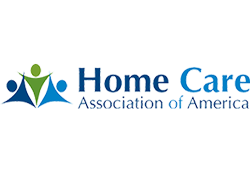Benefits of Home Care
How In-Home Care Improves Quality of Life for Seniors
When faced with the daunting task of elder-caregiving, many don’t know where to begin sorting through all the daunting options available. But in fact, the answer may as simple as letting Mom & Dad stay put—helping them age comfortably, and gracefully, at home.
Home care is not always the best solution for every eldercare situation, particularly if the home environment is unsafe or if your parent requires a very intensive medical needs. However, for millions of American families home care is a sure bet.
Beyond the cost savings, home care offers your parents the ability to remain in their own home . By surrounding them in a safe, therapeutic environment you can prolong their health and do wonders for the well being of your entire family.
Whether or not you decide to hire a professional care, home care provides a variety of benefits for both the recipient and the family. Allowing your parent to remain at home is a seemingly minor decision that can mean so much.
Below, we offer several considerations that can help you make an informed decision about keeping your aging parent at home:
1. Home care promotes recovery.
No matter the duration, hospital stays can be traumatizing. The sheer experience of rapid-fire medical procedures can leave an older adult in a compromised state. If your parent has recently been discharged from the hospital, home care permits a person to rehabilitate in the comfort of his or her own home. Being in a familiar environment allows someone to receive the best support in healing both their body and their mind. In fact, research shows home care expedites healing – demonstrating older adults heal more quickly at home versus in a hospital or nursing home setting. There is also significantly less chance of re-hospitalization when recuperation is at home. (Avalere Study 2008)
2. Home care saves money.
Sure, moving Mom or Dad to a nursing home sounds like the traditional solution, but institutional care comes with a hefty price tag. According to recent data provided by John Hancock Financial, the average annual cost of care in the U.S. for a private room in a nursing home is $85,775 and $75,555 for a semi-private room, whereas home health care average $37,440 annually. A good rule of thumb is that eight hours or less per day of home care will be less expensive than care in a facility. Purdue University researcher, Laura Sands, concluded that part-time non-medical home care costs 1/3rd of that paid for nursing home care.
3. Home care honors your loved one’s dignity and independence.
Did you know: Seniors fear moving into a nursing home and losing their independence more than they fear death itself? According to the study, nearly 90% of seniors want to age-in-place. It’s no surprise, since home care allows older adults maximal freedom and control as they age. Throughout life, our home is our castle, our sanctity – and that doesn’t change as we add more candles on the cake. The home setting is a “least restrictive” environment that allows older adults to remain engaged with their typical daily activities and to remain in the community. It epitomizes the movement towards “patient-centered care”. It gives our parents more choices and the opportunity to be more active participants in their own lives. With home care, parents are not subject to the rules and regulations of any facility. They have the freedom to choose a doctor, nurse, or home health aide that works best.
4. Home care is personalized.
No one person, lifestyle, or situation is the same. Home care recognizes how essential specialized care is to maintaining health and offers individualized services based on individual needs and preferences. By definition, home care is one-on-one. Because it is personalized, home care is more efficient, cutting down on expensive travel and administrative costs of seeing multiple health providers. Home care is typically provided by a unified team of practitioners that may include home health aides, nurses, social workers, therapists, and physicians so you know what kind of care is be given. This sort of continuity can be critical for those dealing with long-term chronic illness
5. Home care keeps families together.
In times of sickness, the family bond takes center stage. Families are an imperative source of technical, mental, and emotional support for the aging. Knowing your loved one is in a safe, therapeutic environment of his or her choice helps reduce feelings of guilt associated with caregiver’s burden. Those who choose home care have the advantage of unrestricted visiting hours. Family members can visit as often as necessary without concerns about intruding or “stepping on other people’s toes”.
6. Home care is safe.
While hospitals are generally regarded as safe-havens, over 20% of those hospitalized develop a complication such as an infection. When someone is cared for at home, the risk of infection nears zero. The one-on-one attention of home care means your loved one receives swift, immediate care – no red tape, no forms, and no bureaucracy. A qualified home care professional can also help make the home environment safer, providing easy fixes such as grab bars and anti-slips rugs.
7. Home care extends and improves quality of life.
Home care postpones institutionalization and prevents pre-mature decline. By encouraging independence and self-directed care, home care keeps aging parents in charge of their own lives for as longer as possible. Unlike other forms of health care, older adults heal faster at home. Home care helps extend life by eliminating stressors associated with aging. Home care also enriches the quality of our loved one’s later years. Those receiving home care tend to report high rates of satisfaction with the services they receive and life overall.
8. Home care and technology go hand-in-hand.
In today’s hyper-connected culture, home care makes more sense than ever before. Spawned by the ubiquity the web, health care delivery is smarter, faster, and cheaper. Advances in technology have brought us gadgets including automatic sensors, smart pillboxes, and remote monitoring systems like eCaring that share health data with family or a medical professionals. As more adult children live far away from their aging parents, technology makes remote caregiving possible — enabling over 6 million Americans to care for loved ones from afar. In rural areas, home care is the only form of healthcare available. Thankfully, the practice of telemedicine makes it possible to diagnose, monitor, and treat conditions all from a patient’s home.
9.Home care is oldest and most respected form of health care.
From the beginning of civilization, elders have aged-in-place within their own homes (cottages, castles, palaces, or huts). Home care represents the best, most validated, and highly regarded method of health care delivery in the United States. Modern technology has only elevated home care’s limitless potential. With today’s development, virtually anything that is available at a hospital or through a physician can be done at home, reducing cost and improving quality of life. Though home care has been centuries in the making, the best is yet to come!
eCaring May 2, 2012
Related Articles to Non-Medical Home Services
- Benefits of Home Care
- Home Health vs Home Care
- Home Health vs Hospice Care
- How to Introduce Home Care for Seniors
- Building a Care Plan-Working with a Home Care Provider to Create a Personalized Approach to Care
- Resistance to Home Care 2023
- Medicare Doesnt Cover Everything
- Adjusting to Assisted Living
- Warm Weather Tips for Seniors
- Winter Safety Tips for Seniors
- Fall Hazards
- Solution Home Care
- Caregiver Support Groups
- Caregiving During the Holidays
- Talking to Your Parents About Senior Care Options

